Ethanol recovery machines are essential equipment in industries such as pharmaceuticals, food processing, and biofuel production. These machines play a crucial role in the efficient recovery of ethanol from various solutions, ensuring cost-effectiveness and environmental sustainability. In addition, we also have ethanol recycling machines, acetone recycling machines, waste paint recycling machines, thinner recycling machine etc.
What is an Ethanol Recovery Machine?
An ethanol recovery machine, also known as an ethanol distillation unit or ethanol evaporator, is a specialized apparatus designed to separate ethanol from solutions containing water and other solvents. These machines utilize principles of distillation and evaporation to achieve high-purity ethanol recovery.
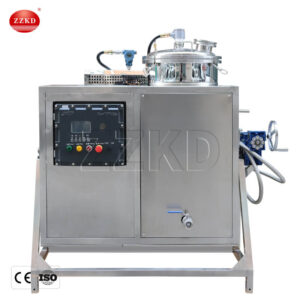
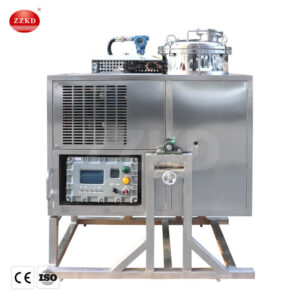
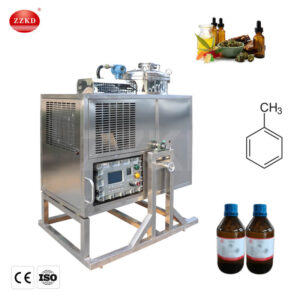
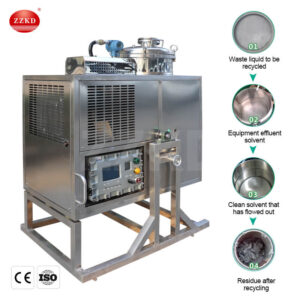
How Does an Ethanol Recovery Machine?
The working principle of an ethanol recovery machine involves several key steps:
- Evaporation: The solution containing ethanol is heated in a controlled environment, causing the ethanol to evaporate. As ethanol has a lower boiling point compared to water and other solvents, it vaporizes more readily.
- Separation: The vaporized ethanol is then passed through a condenser, where it is cooled and condensed back into liquid form. This separation process allows for the isolation of pure ethanol from the original solution.
- Collection: The condensed ethanol is collected in a separate container, while any remaining water or solvents are either discarded or recycled for further processing.
- Refinement (Optional): In some cases, additional refinement steps such as molecular sieves or fractional distillation may be employed to further purify the recovered ethanol to meet specific quality standards.
Benefits of Ethanol Recovery Machine
Ethanol recovery machines offer several advantages, making them indispensable in various industries:
- Cost-Effectiveness: By recovering ethanol from waste or byproducts, these machines help reduce raw material costs and minimize waste disposal expenses.
- Resource Conservation: Ethanol recovery machines contribute to resource conservation by maximizing the utilization of ethanol and reducing the demand for fresh solvent inputs.
- Environmental Sustainability: The recycling of ethanol through recovery machines reduces the environmental impact associated with ethanol production, such as energy consumption and greenhouse gas emissions.
- High Purity: Ethanol recovery machines can achieve high-purity ethanol output, suitable for use in pharmaceuticals, beverages, and other industries with stringent quality requirements.
- Process Efficiency: These machines are designed for efficient operation, with automated controls and optimized process parameters to maximize ethanol recovery while minimizing energy consumption and processing time.
- Versatility: Ethanol recovery machines can be tailored to handle a wide range of feedstocks and solvent compositions, making them versatile solutions for various applications.
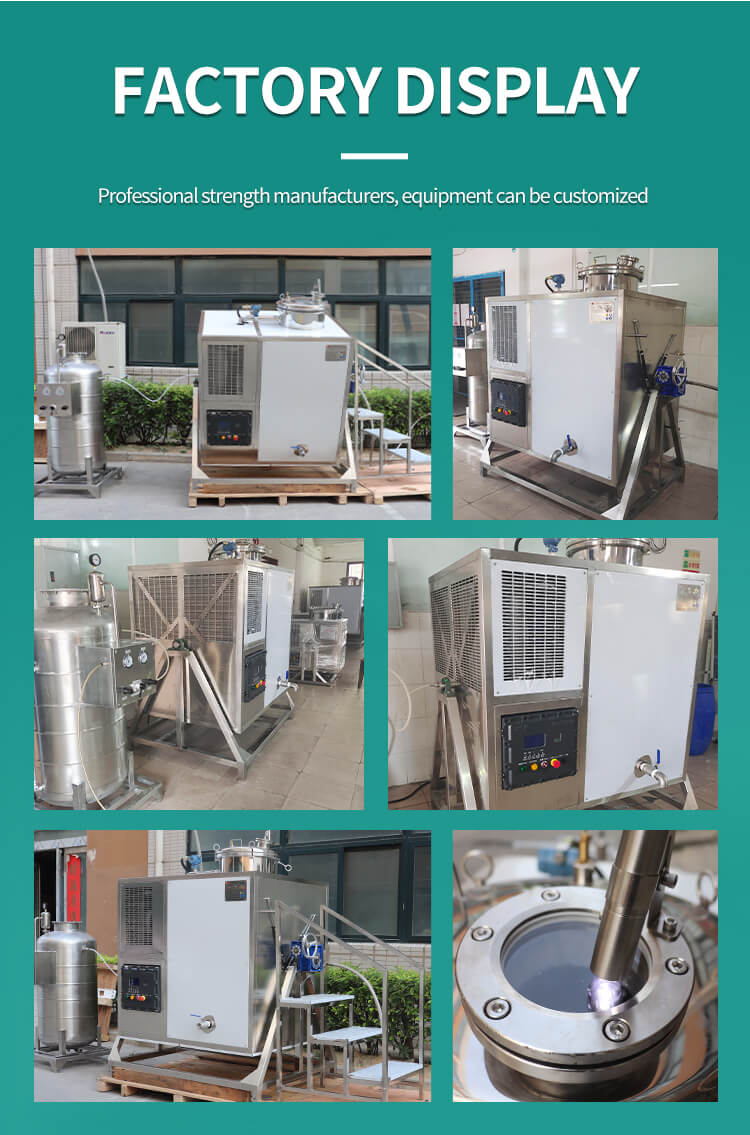
Is Investing in an Ethanol Recovery Machine a Wise Decision for Businesses?
Undoubtedly, investing in an ethanol recovery machine can yield significant benefits for businesses. However, the extent of these benefits varies depending on the company’s specific needs and objectives. When considering such an investment, businesses often have diverse motivations. Some prioritize reducing costs associated with ethanol consumption in their operations, while others focus on meeting environmental regulations or improving overall efficiency in ethanol production processes. Much like customers considering various factors when selecting products, such as price, quality, and reliability, businesses must also carefully evaluate different aspects to choose the most suitable ethanol recovery machine for their operations.
How Can Customers Determine the Right Ethanol Recovery Machine for Their Needs?
Customers can assess their requirements based on factors such as the volume of ethanol waste generated (daily or monthly) and the types of ethanol-based processes involved. Ethanol recovery machines come in various sizes and configurations to accommodate different production capacities. By estimating their monthly ethanol waste volume and considering factors like recovery efficiency and operational costs, customers can select the appropriate machine size and type. For example, smaller-scale operations may benefit from a compact ethanol recovery unit, while larger facilities may require a more robust and high-capacity machine. These decisions should align with the company’s production goals and operational requirements.
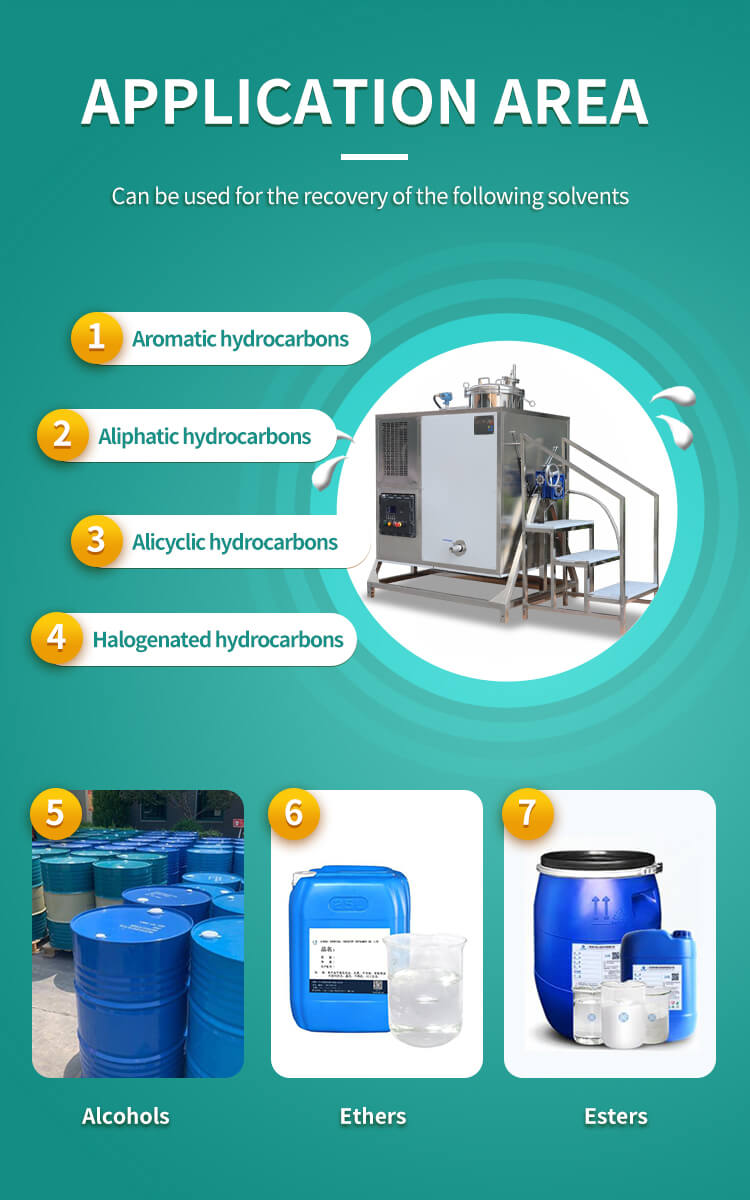
What Are the Key Advantages of Investing in an Ethanol Recovery Machine?
Investing in an ethanol recovery machine offers several key advantages for businesses. Firstly, it allows for the efficient recovery and reuse of ethanol, reducing overall consumption and costs associated with purchasing new ethanol. Additionally, ethanol recovery machines contribute to environmental sustainability by minimizing waste and reducing the carbon footprint of ethanol production processes. Moreover, these machines are designed for ease of operation and maintenance, ensuring smooth integration into existing production workflows. Ultimately, investing in an ethanol recovery machine enables businesses to optimize their ethanol utilization, improve operational efficiency, and remain competitive in the ethanol industry.
